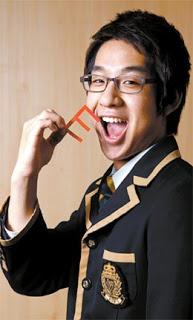
So what is getting my goat in Korea at the moment? English speaking competitions. These little contests seem to be cropping-up in many schools this month in my area, perhaps June is 'English Month'.
Now, I can only comment on the English speaking contests I have had the experience of knowing about, many are run in a different format and especially those run by foreign institutions and for those at high levels, but every one I know of in public schools in Korea is really not about speaking at all. More specifically they are about writing essays in English, which the students then speak out loud to a set of judges.
Perhaps I am being pedantic, you think, it is still speaking and after-all it is their own work, right? Well, very often, no it isn't their own work. Let's start with the students in my own school and their "speaking" contest.
At the time of writing this, my school held this competition yesterday, and the process leading up to this left me with a number of curiousities into the purpose and the effectiveness of the whole project. If you were going to set up a system of learning in a school that might actually garner negative results in student education and is totally illogical, you might want to copy the way many Korean schools are handling these events. Here is my little list of the problems I see:
1. They hold an English speaking contest, but the best person in the school to judge the contest is not utilised to judge it, i.e., the foreign teacher. I was, of course, quite happy not to be asked at it was out of my contract hours, but if there is one job a foreign teacher could do really well in Korea, it is judging students speaking levels. Not even thinking about using them for this purpose is just plain weird.
2. It is labelled a speaking contest, but essentially it is a writing and reading contest. Again, why not utilise the foreign teacher and have dialogues between students and the teacher? I have never seen or heard of this in my province in Jeollanamdo, maybe this does happen elsewhere, anyone care to comment?
3. The written essays are checked by teachers. In a classroom situation this would be fair enough and also after the contest, as students require feedback to improve, but how can you judge a student's English ability when all they have written has been corrected by an English teacher before the contest? Surely, then you are just judging the merits of the essay itself, so why not just have it written in Korean?
4. The written essays are sometimes completely altered by teachers. One student came to me this week and asked for me to check his work, which I did. A day later he came back and asked me to check again because his Korean English teacher (this teacher is one of those that can't really speak the language at all well) had noticed some mistakes. Actually, what he highlighted were not mistakes, just perhaps a few awkward sentences that I did not try and completely alter. There were other parts where he suggested completely different sentences to be written (which were also grammatically incorrect). I had only corrected grammatical errors and spelling, the Korean teacher was suggesting whole changes to the material to make it read better. What is the point of this? Whose work does it become? I then had a slight argument with the student who didn't believe me when I said that his sentence was perfectly OK and he didn't need to change it. He then asked another Korean English teacher for his opinion, still not trusting me. I thought then and there that this would be the last time I corrected any student's work for a speaking contest; he was wasting my time, his time, and insulting my intelligence in the process. Who would you trust to correct your English? An Englishman or a Korean English teacher that can't speak English? Apparently, a non-English speaking Korean is a better option.
 In short, it is pretty obvious that I am hinting that speaking competitions (at least the ones I have been privy to) are a complete waste of time. There are more issues, however, that go even deeper (and more annoying) that actually make some of these contests drive a kind of anti-education. What I mean is that what teachers and parents are encouraging is not only a waste of time, it is teaching young people all the wrong things.
In short, it is pretty obvious that I am hinting that speaking competitions (at least the ones I have been privy to) are a complete waste of time. There are more issues, however, that go even deeper (and more annoying) that actually make some of these contests drive a kind of anti-education. What I mean is that what teachers and parents are encouraging is not only a waste of time, it is teaching young people all the wrong things.Checking students from your own school is bad enough, but when you get requests to correct work from people you barely know, or even don't know, my knickers really do get in a twist. This tends to happen to me quite a lot.
My wife is a hagwon teacher at the moment, but even when she was a nurse - because of the fact people knew she was married to an Englishman - she would receive requests to check English essays and tests (or have me check them). This month, not only has she been given lots of 'speaking' contest essays to check (and I have to help with them) from her hagwon student's parents, but she even had a woman that has seen her in the gym ask her to meet her for 30 minutes on a Saturday to translate her daughter's work. This woman had never met my wife, just asked for her number from another member of the gym she goes to. She even had the audacity to ask if she wouldn't talk to anyone about helping her and to keep it secret. Needless to say, my wife did not meet her, but she e-mailed my wife her daughter's essay nonetheless, which was entirely in Korean, her daughter did not even attempt to write in English.
I know what you will all say, we should tell them where to go or just not reply, but those that aren't linked into Korean culture or aren't Korean cannot possibly know how damaging doing this can be. If my wife refused to help a student at her hagwon she would risk losing her job as parents are quite happy to fiercely complain about almost anything to hagwon bosses, after-all there are plenty of other hagwons that can take their place. Even the woman in the gym can make my wife's life difficult and word gets around in a small city fast about disrespectful, selfish, young women, don't you know. I can refuse to help, I am a foreigner, it doesn't matter if they think I am acting selfishly, my wife on the other hand is Korean and Korean society can make life hell for those that don't do their duty for others, especially when they are the younger person. Korea really is a gifts and favours culture; people are not afraid to ask for them and they are not afraid to abuse you to other people if you don't give them.
So, using the example of this rather cheeky woman who didn't know my wife but thought it appropriate to ask her to write an essay in English for her daughter anyway, what is the motivation and the effect of behavior like this? Here are some thoughts that immediately came to mind:
1. The girl was an Elementary school student, surely the teachers at her school would know that this was not her work.
2. The teachers at the school must be aware of this particular student's English work and level in class, so surely they must be able to figure out that this cannot be her work.
3. The purpose of an English contest must be to motivate students or assess the best students, neither is being done if people are seeking outside help and at worse not even bothering to try to write English themselves.
4. The mother is teaching her child to cheat, plain and simple. Don't even try, just get someone to do your work for you and pass it off as your own.
5. Given that there are obviously a number of people entering Englsih contests from schools with perfectly composed English essays, does this mean that they all seek outside help? Because, if they don't, their essays will look really dumb compared to the rest.
6. Are the prize winners really just a product of wealthy parents who can pay for private tutors to help their children, audacious parents that don't mind asking strangers for favours, and/or lucky parents who know a native English speaker or a proficient Korean?
7. What are parents getting out of such endeavours? My suspicion is the ability to proudly boast that their child won an English speaking contest. In other words, parents put to the back of their minds whether their child is actually learning English as long as it appears that they are. It serves as a bit of a status symbol for them and is a lesson for us all in the power of wishful thinking, delusion, deception, and denial.
8. What are the children getting out of such endeavours? This is perhaps the most troubling aspect, all I can see is that this is:
a) A waste of time
b) A lesson that cheaters prosper
c) Deluding a child into thinking their ability is higher than it actually is
d) Teaching a child that cutting corners gains results
e) Teaching a child that winning is everything, no matter how you achieve it
f) It may even breed a strange arrogance in them

Are their any benefits at all? There are not many, but I can invisage perhaps one and that is encouraging them to stand-up and read English out loud to people and the handling pressure that comes with it. It could be that Korean children have enough pressure to deal with in their education already, however.
What Should be Done Instead
Firstly, if you are going hold a competition that is billed as an "English Speaking Contest" make it a speaking contest, not a reading and writing contest. Schools can use their foreign teacher and/or a high level and confident Korean English teacher to have interactive dialogues with the students. This would certainly sort out those with true English ability and "pretenders" need not apply. It would be nearly impossible to blag and cheat your way through a situation like this.
I am fairly convinced that education worldwide is pretty poor at the moment, but the problems in Korea are more obvious than most and especially with regard to English education. These contests show this clearly. What could be more obvious than having proper speaking contests, like I mentioned? Why is this not being done? The answer is that Korean people have created a culture of their own around learning English. English is learnt like history, as an almost endless stream of events to memorize, but in English's case, words and grammar. It is not learnt to communicate, if a student wants that, then they have to sort that out for themselves because their school is not in the business of teaching English for this reason. People fear to speak it and they fear embarrassment, it is just not a comfortable thing to do. What is comfortable and safe is sitting at a desk and passively learning grammar rules and endless vocabulary. One should also be worried about the culture of cheating and corruption that is occurring in this part of the world relating to education. As grades become more and more important, so true learning becomes less and less meaningful. The score is all that matters and cheating is one way to achieve it.
For Koreans to genuinely improve their English - indeed for anyone to improve at almost anything - they need to step out of their comfort zone. For me personally, coming to Korea has been one of the greatest learning experiences of my life precisely because I am regularly taken outside my comfort zone, and this is especially true with regard to my wife's family. All those awkward moments, the moral outrages that come with clashes of culture, and the frustrations add up to greater knowledge, understanding and wisdom in the end. This is what education and learning should be all about, not memorising, cheating, show-boating, and denial in order to remain comfortable or to be respected.
Note: Maybe we should not stop students cheating in competitions and tests, we might have riots on the streets and in the schools!
